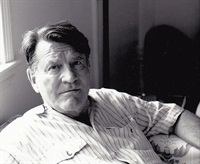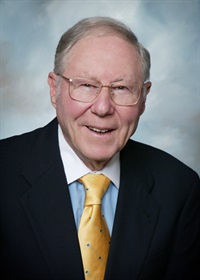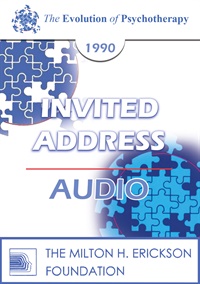EP90 Invited Address 01a - Zen and the Art of Therapy - Jay Haley, MA
- Average Rating:
- Not yet rated
- Topic Areas:
- Invited Addresses | Buddhism | Ericksonian Hypnosis and Therapy Techniques | Psychotherapy | Strategic Therapy | Art and Creativity
- Categories:
- Evolution of Psychotherapy | Evolution of Psychotherapy 1990 | Pioneers in Couples and Family Therapy
- Faculty:
- Jay Haley, MA | William Glasser, MD
- Duration:
- 1 Hour 16 Minutes
- Format:
- Audio Only
- Original Program Date:
- Dec 12, 1990
- License:
- Never Expires.
Description
Description: Drawing parallels between Zen Buddhism and strategic therapy, this session emphasizes present-moment focus, action over analysis, and the value of personal relationships. It highlights similarities with Milton Erickson’s directive, practical methods. Topics include the pursuit of sudden change in therapy and the role of power dynamics in the therapeutic process. Examples of cases and Zen stories are compared. Zen, systems theory, and Erickson's strategic therapy are brought together.
Syllabus Description: A presentation of the influence upon therapy, particularly Strategic Therapy of Zen Buddhism. Similarities between therapeutic change and spiritual enlightenment are discussed in terms of the relationship between Master and trainee and therapist and client. The use of directives, of riddles, of absurd tasks, and the types of single interventions and paradoxical procedures are discussed. Examples of cases and Zen stories are compared. Zen, systems theory, and Erickson's strategic therapy are brought together.
Educational Objectives:
- To describe a primary influence on therapy.
- To describe similarities between Eastern philosophy and Western therapy.
- To present different and similar theories of change.
*Sessions may be edited for content and to preserve confidentiality*
Credits
Handouts
| Timestamped Transcript (977.2 KB) | 23 Pages | Available after Purchase |
| Ericksonian Learning Snapshot (248.1 KB) | 2 Pages | Available after Purchase |
Faculty

Jay Haley, MA Related Seminars and Products
Jay Haley (M.A., 1953, Stanford University) was Director of Family Therapy Institute of Washington, D.C. He was one of the leading exponents of the strategic/interpersonal approach to family therapy. Haley served as Director of the Family Experiment Project at the Mental Research Institute and as Director of Family Therapy Research at the Philadelphia Child Guidance Clinic. He has authoered seven books, co-authored two and edited five. Additionally, he has more than 40 contributions to professional journals and books. Haley is the former editor of Family Process, and the first recipient of the Lifetime Achievement Award of The Milton H. Erickson Foundation.

William Glasser, MD Related Seminars and Products
William Glasser, MD, who received his MD degress in 1953 from Case Western Reserve University was an American psychiatrist. William was awarded an honorary doctorate in human letters by the University of San Francisco. Founder and Director of the Institute for Reality Therapy, he was authoer and editor of ten books on the topics of reality therapy and education. He was also the developer of Choice Theory. His ideas, which focus on personal choice, personal responsibility and personal transformation, are considered controversial by mainstream psychiatrists, who focus instead on classifying psychiatric syndromes as "illnesses", and who often prescribe psychotropic medications to treat mental disorders.


